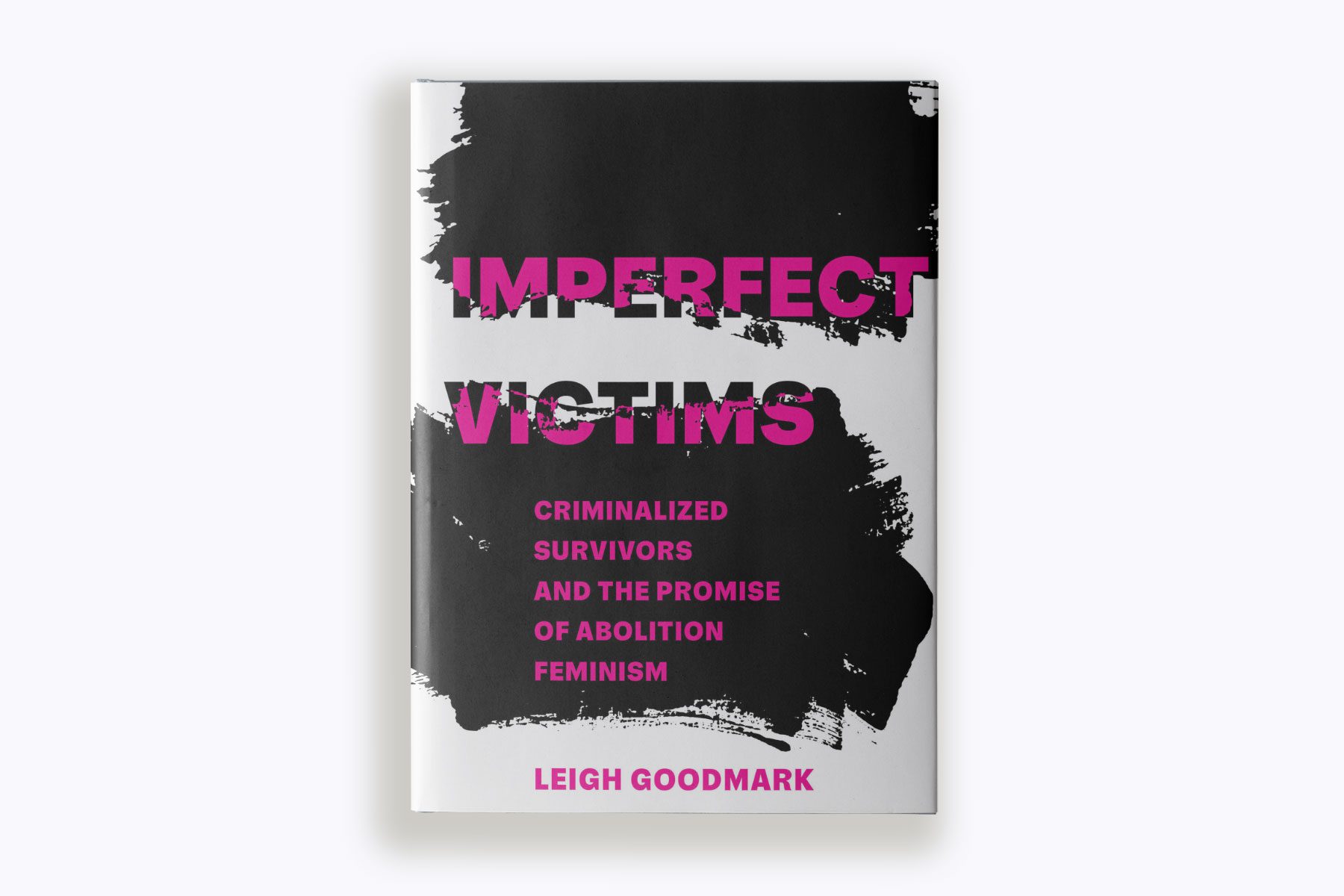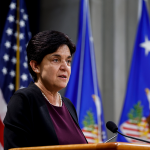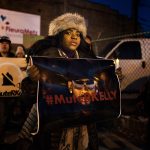It took Leigh Goodmark a while to come around to abolition feminism. Early in her career she believed that the way to address intimate partner violence was to lock up those inflicting harm.
But as she began to work more closely with survivors of abuse and intimate partner violence, she realized it was not that simple. Many of the women who were survivors were incarcerated as a direct result of the violence they had endured, after defending themselves or fighting back against abuse. Learning from these women helped Goodmark to understand that, in many ways, the carceral system was harming those she was striving to help.
Now, Goodmark — the Marjorie Cook professor of law and co-director of the Clinical Law Program at the University of Maryland’s Carey School of Law — believes in investing in structures and institutions that prevent violence instead of relying on the carceral system to respond to it.
In her recently released book, “Imperfect Victims: Criminalized Survivors and the Promise of Abolition,” Goodmark details how survivors of abuse are often funneled into the criminal legal system, especially if they are poor, especially if they are a person of color, especially if they are lesbian, especially if they are transgender — especially if they do not fit the image of a “perfect victim.” She details why she believes that working to protect survivors actually means working toward a system that does not center on criminalization and incarceration.
The 19th spoke to Goodmark about her book and beliefs about what a system that better protects survivors could look like.
This interview has been edited for length and clarity.
Rebekah Barber: How do you define abolition feminism, and how did you come to view it as the way forward?
Leigh Goodmark: I define abolition feminism as a feminism that rejects the intervention of the carceral state to solve a variety of problems, but particularly problems created by gender-based violence. I came to abolition feminism through the work of Beth Richie, Andrea Richie, Angela Davis and Mariame Kaba: people who are anti-violence activists, but who recognize that criminalization was not decreasing or deterring intimate partner violence. In fact, it was making it worse. Communities of color were particularly disserved by reliance on criminalization.
I started out as a pretty typical carceral feminist. I don’t use that as an insult. I use it as a descriptor. I believed, at the beginning of my career, that the way to deal with gender-based violence was to lock people up. Through study, through working with my clients who did not want their partners locked up and wanted other kinds of solutions, and through my work with incarcerated survivors, I’ve come to reject the idea that criminalization can solve these problems. It’s a violent system, and violence is not the answer to violence.
In your book, you talk about how young girls, particularly young girls of color, are often funneled into the criminal legal system after becoming victims of abuse. What sort of systems do you think need to be in place to stop this cycle?
We need to do a lot more with prevention. We have social science research and other data that tells us that intimate partner violence and other forms of gender-based violence are directly tied to economic stress and dislocation, to community distress, to the experience of trauma. There are all kinds of evidence-based programs that can address these things. This includes knowing that everyone has what they need not just to survive, but to thrive: having a guaranteed living wage, having access to health care and mental health care, transportation, food and safe housing.
We have relied on a feminist narrative that says intimate partner violence is about someone’s desire for power and control over their partner. While power and control may be the outcome, there are so many things that are going into the use of violence that we’re not even talking about in intervention programs. The good programs are able to hold two difficult ideas in their hands at the same time: that somebody is using violence, but also that somebody has experienced trauma. Very few people experience trauma for the first time as perpetrators. Most people experience trauma for the first time as victims in some way.
Many of the stories of criminalized survivors you uplift early on in your book are of Black women and girls like Celia (an enslaved woman who killed her master in self defense and was later executed for the murder). What role does race play in determining whether or not a person will be viewed as a victim?
In Celia’s story you see a woman being told that she couldn’t be a victim because she was property. That idea that a victim is White has been with us since that time, if not earlier. You then get the trope of the angry Black woman, and so Black women are never victims because they’re not weak, they’re not meek and they’re not passive.
Even when Black women are expressing emotions that are not necessarily anger, it often gets read as anger. A “perfect victim” is someone who conforms to all of the victimization stereotypes. Black women particularly, but also other women of color, violate those stereotypes from jump. Even some White women aren’t White enough to be victims if they are not refined or respectable women, but they are rough women.
When people say the “system is broken” — the system is not broken, the system is doing exactly what it was designed to do, which is to police and punish the behavior of people who fail to conform to these very narrow stereotypes about who is worthy of protection.
You also write that “most criminal convictions — around 70 percent — result in some prison time, but there’s very little evidence that incarceration prevents future offending.” Can you talk a little bit more about what you have come to believe is a more productive way to address crime and violence?
The economic piece of it is to acknowledge the evidence that shows that economic distress is highly correlated with the perpetration of violence and to do something about that: both to put economic power into the hands of people who are being abused so that they have choices about how they want to confront that abuse and to ensure that men are not under- and unemployed, which is the single most significant correlate with the perpetration of intimate partner violence.
Then it’s the prevention. That can look like working in early childhood, with new parents and with adolescents. It can also look like societal-wide interventions around guns, which is the big conversation we desperately need to have in the United States, but won’t — but also around alcohol. The evidence is pretty significant around the relationship between violence and alcohol.
We can look at community-based interventions. People in the anti-violence world have known for years that the vast majority of people don’t go to law enforcement. They’re going to their friends, family and community members. We’re not providing those folks with any kind of assistance or training resources to deal with these problems.
Are there any policies that are being implemented in localities or states across the country that are really working to combat violence in a way that does not involve the carceral state?
There are little pockets here and there and probably lots of things that are underground, but things that are particularly exciting to me are non-carceral first responders. In Chicago, I think they’re getting ready to pilot a program that sends out violence interrupters who have a great track record with doing that kind of work, but doing that in tandem with anti-violence specialists so that when they’re responding to a case involving intimate partner violence, there’s someone there who understands those dynamics and can be helpful. The greater willingness of restorative justice practitioners to think about the role that restorative justice can play in situations involving violence is really exciting. Traditionally, people have been very reluctant to take on that kind of work.
There’s been a huge push from the anti-violence community against restorative justice traditionally, but that’s starting to change. The Violence Against Women Act creates a pretty strong incentive for anti-violence services to be engaged deeply with the carceral state, but there are places that are rejecting that.
There’s also important legislative work going on to restrict the use of cash bail, which has an enormous impact on survivors of violence who are arrested for crimes related to their own victimization; to get rid of mandatory minimum sentences, which have a huge effect on criminalized survivors; to get rid of mandatory arrest laws [that require police to make an arrest in an intimate partner violence case when they have probable cause to do so], which were adopted in the 1970s and 80s in response to police inaction in cases of gender-based violence, but which have a disproportionate impact on women of color. There are efforts going forward to try to get second-look sentencing, so that we can reconsider the long sentences imposed on criminalized survivors and all of that legislative action, I think, is really important as well.
There are a lot of people who aren’t going to go with me all the way to abolition feminism. It took me 28 years to get there myself. I understand that kind of fear and reluctance, but there are so many things we could do along the way to improve conditions for criminalized survivors that don’t require people to commit today to abolition.
I’d like to go back to the Violence Against Women Act (VAWA). Can you talk a little bit more about ways that you saw that specific policy cause harm? What ways do you think that harm could have been avoided?
VAWA is part of the 1994 Violent Crime and Law Enforcement Act. It came about because then-Sen. [Joe] Biden said to his council, “I need something on women for the crime bill.” Anti-violence activists had been working on the Violence Against Women Act, and it was sold to law-and-order conservatives as a law-enforcement-boosting bill that also deals with intimate partner violence.
What VAWA does more than anything is fund things, and what it funds is the criminal legal system. For community-based agencies to get access to some of the biggest parts of funding in VAWA, they have to be engaged in the work of law enforcement. All of that is promoting criminalization.
We could have avoided this if we had listened to the women of color, who in the beginning, were saying, “criminalization does not serve us, criminalization does not serve our families, this will not go well for us.” You see, for example, Mari Matsuda in 1994, saying, “I don’t understand why the anti-violence community is so excited about VAWA, because it’s going to have all of these negative effects.” You have Angela Davis saying criminalization doesn’t solve the problem of violence. You had Brenda Smith, who is now a law professor, but was then the chief counsel at the National Women’s Law Center, who told the National Women’s Law Center that they should not support VAWA because of its criminalization agenda. It wasn’t that there weren’t voices — voices of women of color — saying don’t do this. It was that the majority of the people in power, many of whom were White activists, weren’t listening. I say that as a White activist who was pro-VAWA. I don’t seek to absolve myself of responsibility here. I am very much a part of that.
Can you think of some other things that policymakers and elected officials might miss when they’re not being informed by directly impacted people, specifically poor survivors and survivors of color?
If you have not experienced intimate partner violence, trafficking, rape or sexual assault as a person with a marginalized identity, you can’t possibly know what it feels like to have the police doubt your story; what it feels like to have the police tell you that you’re too angry; what it feels like to have a prosecutor take everything you’ve said and use it to say you’re not a real victim; what it feels like to have a judge say you’re not a victim, but you’re a manipulator; what it feels like to be incarcerated and to not receive any of the services that you need to help you heal.
That’s part of what I talk about in terms of how I came to be an abolitionist. It was because my clients were saying to me, “this doesn’t work for me, this doesn’t work for my partner, this doesn’t work for our family.” Later, I started representing incarcerated survivors, going into the prison on a regular basis and hearing the stories from my clients about what had happened to them in this system.
It’s infuriating that people make policies that have profound life-changing and life-destroying impact without hearing the voices of those who are affected by them.







